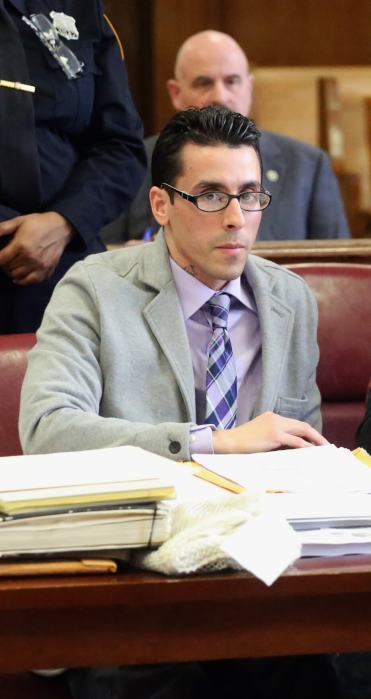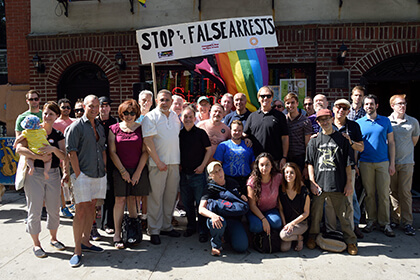As the prosecution ended its case in the murder trial of Edwin Faulkner and Juan Carlos Martinez-Herrera, the gay couple charged in the 2012 death of John Laubach, two so-called spontaneous utterances in which the two admitted to the killing were put into evidence.
“He stated, ‘But I killed him,’” Brian Erbis, a detective in Chelsea’s 10th precinct, testified on October 13, referring to Martinez-Herrera.
Allegedly, the two defendants bound the 57-year-old gay man on March 2 and covered his face with the duct tape that caused him to choke to death. The couple, who had been having sex in exchange for money with Laubach for some time, robbed his apartment and fled to Florida where they were arrested weeks later, on March 15. They were brought back to New York City.
Cop testifies Edwin Faulkner, Juan Carlos Martinez-Herrera, in spontaneous utterances, each acknowledged blame
Erbis said that as they were being fingerprinted, Faulkner turned to Martinez-Herrera, who was sitting in a nearby holding cell, and said, “I told you I got everything. I will wait even if I have to see my baby again after 15 years,” implying that he was taking full blame for the crime and anticipating a 15-year prison sentence. Martinez-Herrera responded with his comment taking responsibility for the killing.
Daniel Parker, who represents Martinez-Herrera, aggressively cross-examined Erbis, noting that during pre-trial hearings, the detective testified that “they” had been put in a cell. On October 13, Erbis said they were put in separate cells. He also said they were brought from an upper floor in the precinct to the room where arrestees are processed without speaking.
If they were in a cell together, they could have had their conversation privately without being overheard by detectives. The defense hopes jurors will doubt that two men who said nothing to detectives would suddenly blurt out admissions in front of them.
Before ending its case on October 14, the prosecution played three 2014 calls that Faulkner made from jail on Rikers Island. In one conversation, reportedly with his father, the other party, not Faulkner, states that he is telling friends that the 33-year-old is charged with “homocide.”
The calls were introduced over defense objections. The concern is that the jury will see Faulkner as having the same attitude as the party he was speaking with. Most calls made by inmates from Rikers Island are recorded. Inmates are told by an announcement at the start of their calls and by signage that they are being recorded.
Faulkner and Martinez-Herrera are charged with second-degree murder in that they acted with depraved indifference, not that they intended to kill Laubach; felony murder, based on the allegation they caused Laubach’s death in the course of committing another felony; and kidnapping and robbery, the charges that form the basis for the felony murder charge.
The prosecution case is hampered because there is no eyewitness to the killing nor can prosecutors assert that Faulkner and Martinez-Herrera were the last people to see Laubach alive. Martinez-Herrera’s fingerprints were found on a knife and the duct tape that were used to execute the crime. Laubach’s antiques and collectibles were in the couple’s possession when they were arrested, and there is video of them attempting to withdraw cash from Laubach’s bank account using his ATM card. The jury has seen pawn shop records showing them selling Laubach’s possessions, photos of Laubach’s property on one of their cell phones that were taken after Laubach’s death, and data from the couple’s cellphones showing web searches made after Laubach’s death in English and Spanish for “antiques,” “collectibles,” “antique coins,” and other topics that suggest they were hoping to sell Laubach’s property. There is other evidence linking them to the crime.
The prosecution is hoping jurors will infer from this mountain of physical evidence –– over 150 exhibits –– and police and expert testimony that Faulkner and Martinez-Herrera are guilty beyond a reasonable doubt.
Faulkner gave a lengthy statement to police, but he implicated Martinez-Herrera in the crime in that statement, which creates a confrontation problem. The only way Martinez-Herrera could refute the statement is by calling Faulkner to the stand. The US Constitution bars compelling a defendant to give evidence against himself as Faulkner would likely have to do if he took the stand.
After the prosecution rested, the defense moved to dismiss the case, arguing that the prosecution had not proved that the couple placed the tape on Laubach’s face and that one charge, depraved indifference murder, was also not supported by the evidence or the law.
“The people have not really presented any evidence as to how the tape arrived over the victim’s mouth,” said Lori Cohen, who is working on the defense team. “There’s no theory the people have presented that would sustain depraved indifference… As to the other charges, the evidence is insufficient.”
In decisions dating back to 2006, the Court of Appeals, the state’s highest bench, has sharply limited the use of the depraved indifference murder charge, going so far as to suggest that it cannot be used in a crime where there is a single murder victim.
“The Court of Appeals has also said a number of times recently that depraved indifference doesn’t apply to single victims,” Cohen said.
Lanita Hobbs, the assistant district attorney who is prosecuting the case with Juan Abreu, disagreed.
“They wrapped his head so tight that it was bursting like a watermelon,” she said. “I call that depraved indifference.”
Bonnie Wittner, the judge in the case, was aware of the prior decisions on depraved indifference and said she would rule later after reviewing those decisions. She declined to dismiss the other charges.
The defense case will begin on October 16.



































